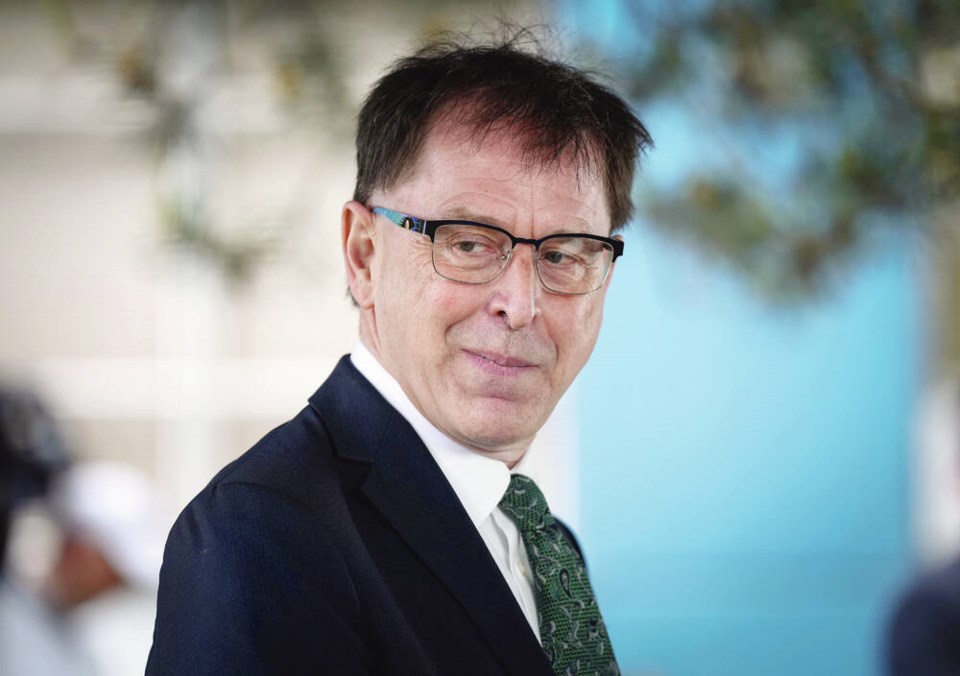With a third Omicron wave expected to peak in August, patients are seeking out ways to get a fourth COVID shot in other provinces and the U.S., says a family doctor.
Eric Cadesky, a family physician and former president of the Doctors of B.C., said he has patients who aren’t eligible for the fourth shot in B.C. and are trying to get one abroad. Other patients confused about when and how they will get their boosters are also looking outside the province.
“There are people who have gotten their third dose who are now seeing that they are past six months and they’re saying: ‘Well, I thought that I was supposed to be getting a booster now — why can’t I?’ ” Cadesky said Monday.
He said some of his patients have arranged their summer travel around getting a fourth dose in another country.
“I think people in British Columbia can see their friends and relatives in other provinces and other countries who have already received a fourth dose and they’re wondering when their turn is going to be.”
Among people eligible for fourth shots in B.C. are those age 70 and older and those at high risk of serious illness, with health officials saying that needs to be the priority for now. But in Ontario, for example, a fourth shot is available to everyone age 60 and older.
B.C. Health Minister Adrian Dix, responding to questions from reporters, said he is concerned about the approximately 1.4 million people who have not had their third shot, given that subvariants continue to mutate and spread, although hospitalization of people with COVID continues to decline.
“If you’re eligible for a fourth dose, get your fourth dose today,” said Dix.
“If you haven’t got your second dose for some reason, get your second dose today. And if for some reason after all of this, you haven’t got your first dose, get your first dose today because this is serious business.”
Dix didn’t directly address the current COVID wave, but said the Health Ministry is planning for a wave in the fall and the “pressure on the acute-care system,” as it coincides with flu season.
“We’re planning for that today, and everyone should be planning to get another dose in the fall — everybody,” said Dix.
The minister said he can’t predict what the pandemic will look like in the fall or whether mandatory masking or other restrictions will be part of it, but “no option is ever excluded.”
“We don’t know what we’re going to face,” said Dix. “Right now, the advice is get vaccinated and be careful because we’re in the middle of a pandemic, and that pandemic can affect all of us differently.”
Canada’s chief public health officer Theresa Tam issued a statement last week saying the BA.4 and BA.5 Omicron subvariants are more transmissible and better able to evade immunity than previous versions, and are expected to bring a rise in COVID cases in the coming weeks.
A University of B.C. COVID modeller predicted the wave will peak in August.
Tam said 40 per cent of Canadians have not received a booster following their primary two shots, putting Canada behind other G7 countries when it comes to getting three doses.
Because the subvariants are immune-evasive, two doses of COVID-19 vaccines offer less protection than against previous variants, making keeping up with boosters important to reduce the risk of hospitalization and death due to COVID-19, said Tam.
The National Advisory Committee on Immunization recently said booster shots should be given in advance of a fall wave for people age 65 and older, long-term-care residents, people who are clinically immune compromised, Indigenous people, and marginalized communities, regardless of the number of booster doses they have previously received. NACI said the boosters may then be offered to those 12 to 65.
NACI said it will provide recommendations on the type of COVID-19 vaccine as evidence on appropriate vaccines becomes available.
Cadesky said as a family doctor on the front lines, he wants to provide the best possible information, but right now he doesn’t know what B.C.’s vaccine stock is, when it will expire, or when his patients will be offered their shots.
B.C.’s system of notifying people when they are eligible for their next vaccine is highly effective, said Cadesky. “The challenge for patients and doctors is waiting and not knowing exactly when that message is going to arrive,” he said.
“I can tell you there are a lot of patients who have young children who told me that they’re very interested in going down [to the U.S.] and getting their young children vaccinated while waiting for a decision here, or even going down and getting a fourth dose.”
Health Canada is reviewing a submission from Moderna for the use of its Spikevax COVID-19 vaccine in children age six months to five years, while the U.S. Food and Drug Administration has already authorized the first COVID-19 vaccinations for infants and preschoolers in the United States.



